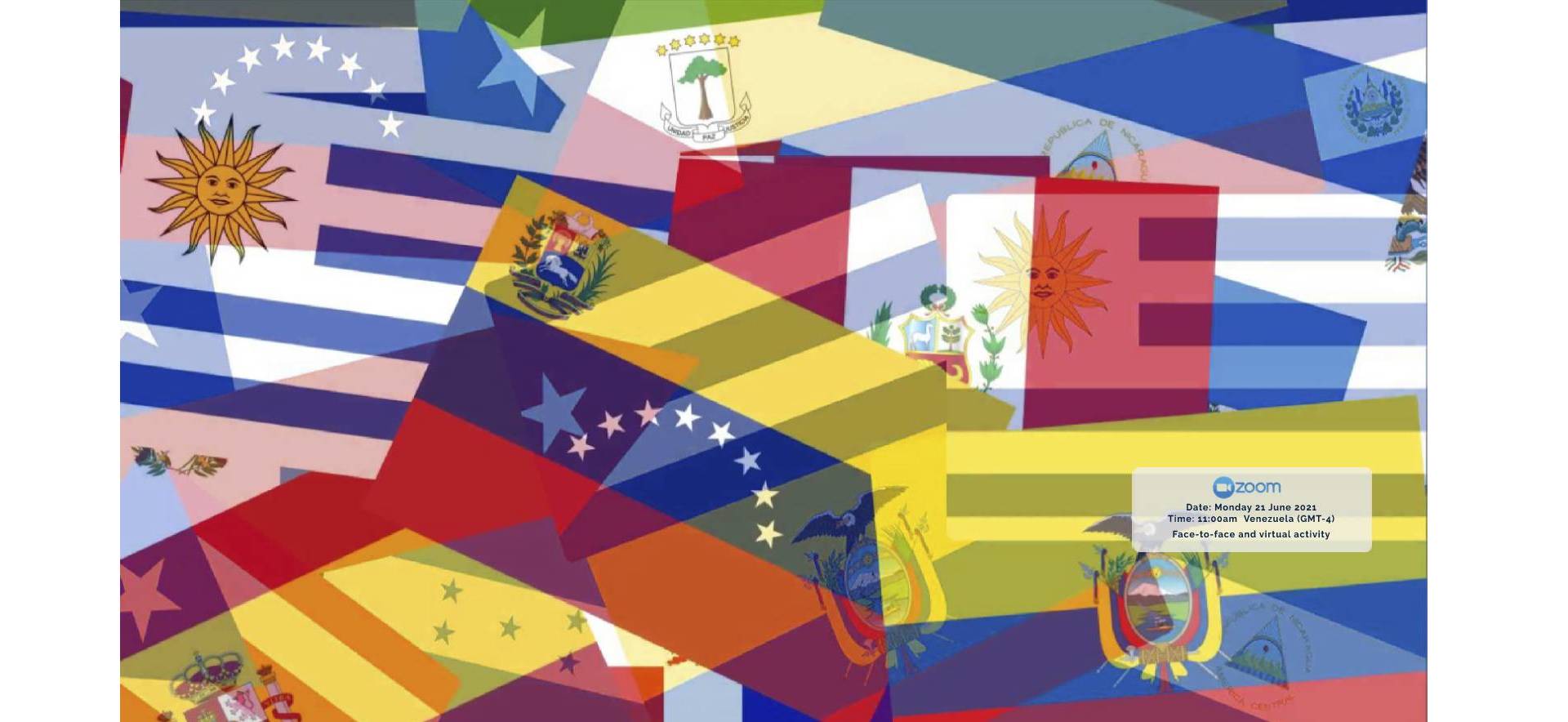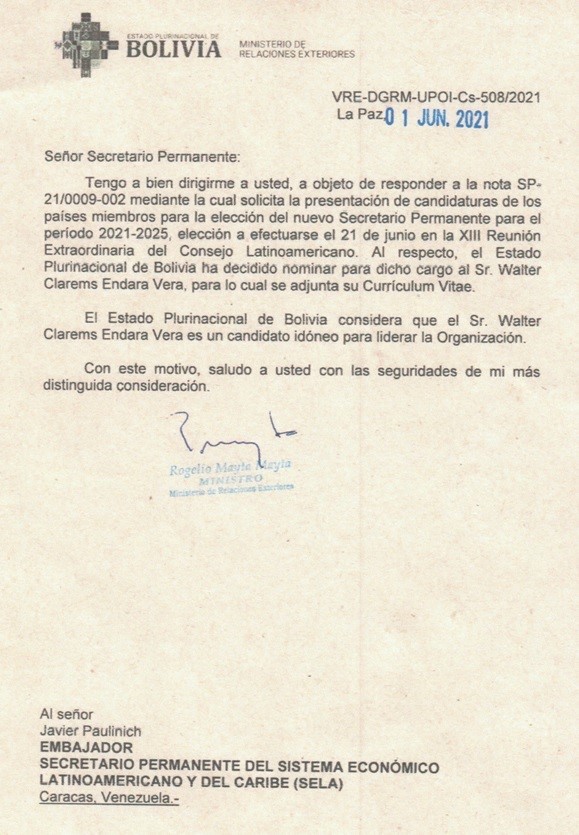
Note by the Permanent Secretary
Articles of the Panama Convention concerning the election of the Permanent Secretary
Article 15
The Latin American Council has the following functions:
Paragraph 2. To elect and remove the Permanent Secretary and the Deputy Permanent Secretary.
Article 17
The Latin American Council shall adopt its decisions:
Article 28
The Secretariat shall be under the direction of a Permanent Secretary. He shall be responsible for the technical and administrative personnel necessary for the performance of the functions of the Permanent Secretariat.
The Permanent Secretary shall be the legal representative of the Permanent Secretariat and in specific cases as determined by the Latin American Council, he shall act as legal representative of SELA. The Permanent Secretary shall be elected for a four-year term. He may only be re-elected once, but not for consecutive terms. He may not be replaced by a person of the same nationality.
Article 1. Elections at the Latin American Council will be held by secret vote. When there is one single candidate and the representatives of more than half of the Member States are attending the meeting, the Chairman of the Council may declare the candidate to be elected, without voting. In case there is any objection, the Council shall proceed to vote immediately, without further debate.
Article 2. In convening the Council Meeting in which a Permanent Secretary or a Deputy Permanent Secretary is to be elected, the Permanent Secretary shall invite the Member States to nominate candidates no less than one month in advance of the date agreed to for the Council meeting, in order to allow for analysis and consultation of the nomination, and shall suggest that the presentation letter be accompanied with the curriculum vitae of the candidate and an account, drafted by the candidate, of the Work Programme that would be developed in case he or she is elected Permanent Secretary.
The provisions contained in the foregoing paragraph shall not preclude the possibility of nominating candidates after the specified deadline, in case it is necessary in order to ensure occupation of the position.
In making a nomination, the Member State must have previously made sure that the candidate is actually willing to take over the position, in case he or she is elected.
Article 3. Candidates to the positions of Permanent Secretary or Deputy Permanent Secretary must be a native and citizen of one of the Member States of SELA. They shall not have the same nationality of the official they are to succeed. In case the election is being made for only one of the aforementioned positions, the candidate shall not have the same nationality as the person who is holding the other position.
Article 4. The election of the Permanent Secretary or of the Deputy Permanent Secretary will require an affirmative vote by a majority of two-thirds of the Member States present, or by an absolute majority of the Member States, whichever is greater.
Article 5. Once the first vote is held, if no candidate obtains the required majority of votes, up to three additional voting rounds will be held, if necessary, so as to decide between the two candidates who obtained the highest number of votes in the first voting.
Article 6. Yet, if no candidate obtains the required majority, the nomination of candidates for the next voting will be open again. If no candidate is chosen in the new voting either, the voting procedure will be undertaken again in accordance with Article 4, and so on until an election is accomplished.
Article 7. The Latin American Council may decide, at any moment, by the majority indicated in Article 4, to postpone the election for a subsequent regular or special meeting of the Council.
Article 8. Unless it is decided otherwise, elections for any other position will be made by means of a favourable vote of the absolute majority of the Member States attending the meeting and voting. If no candidate obtains the absolute majority in the first vote, a new vote will be held to decide between the two candidates who obtained the highest number of votes.

Walter Clarems Endara Vera


Curriculum Vitae
PhD in International Law and International Relations, master’s degree in International Business, master’s degree in International Trade Negotiations, Degree of in-Depth Studies (DEA), Diploma in Management of Teaching-Learning Process in Higher University Education and Diploma in Taxation Law.
Director at the General Secretariat of the Andean Community, he held positions in the Bolivian Foreign Ministry since 2006, as Vice-Minister of Foreign Trade and Integration from 2013 to 2018, Director of Economic Cooperation and Integration and head of various units.
First Substitute Judge of the Court of Justice of the Andean Community (2013-2015).
Professor from 2005 to date in graduate and post-graduate courses on Public and Private International Law, Economic Law and Integration Law, Professor of Public International Law at the Universidad Mayor de San Andrés.
International representations:
Institutional representations:
Lima, May 2021
OBJECTIVES PROPOSED BY THE BOLIVIAN CANDIDATE
FOR THE POSITION OF PERMANENT SECRETARY
OF THE LATIN AMERICAN AND CARIBBEAN ECONOMIC SYSTEM (SELA)
Ambassador Clarems Endara Vera
INTRODUCTION
According to the International Monetary Fund (IMF)[1], global growth is projected at -4.9% in 2020, 1.9 percentage points below the April 2020 forecast. The COVID-19 pandemic has had a more negative impact on activity in the first half of 2020 than anticipated, and the recovery is projected to be more gradual than previously forecast. In 2021, global growth is projected at 5.4%.
For its part, the World Bank[2] reported that COVID-19 has had a huge impact globally and has caused pronounced recessions in many countries. Baseline projections forecast a 5.2% contraction in world gross domestic product in 2020, marking the deepest global recession in decades.
According to the most recent report by the Economic Commission for Latin America (ECLAC)[3], the negative trends in world economic activity have deepened and uncertainty is increasing regarding the dynamics of the post-COVID-19 recovery.
The three organizations agree that demand from China and the industrialized countries will decrease drastically, affecting mainly the countries that produce raw materials in South America (minerals and hydrocarbons), the exporters of manufactured goods and services from Central America and the tourism sector in the island countries of the Caribbean.
Latin America and the Caribbean are the regions hardest hit by the COVID-19 pandemic. The strong contraction resulting from the health crisis has had enormous economic and social costs, also due to the prelude to several years of weak performance, with low average growth and limited progress in social indicators.
The COVID-19 crisis will have a long-term impact on the economies of the region. Lower levels of learning and employment are likely to reduce future earnings, while high levels of public and private borrowing can strain the financial sector and slow the recovery.
Despite the strong impact, an improvement is expected in the economic outlook for Latin America and the Caribbean in 2021. After a 6.7% drop in the regional Gross Domestic Product in 2020, a return to growth of 4.4% is expected in 2021.
This scenario represents a new opportunity for SELA to support the speedy recovery and economic reactivation of the region. Although international trade in goods maintained a relatively acceptable level, it is necessary to evaluate the progress in trade facilitation mechanisms and their incorporation into digitization and simplification of procedures, in order to optimize the digital modernization of foreign trade processes through cooperation.
A greater effort will be needed in the service sector, in particular tourism, as it is the hardest hit. It is necessary to promote tourism among the member countries in the region and in the countries with the highest number of tourists.
The transformation towards accelerated digitization caused by the pandemic becomes an opportunity that can lead to greater dynamism in multiple sectors. SELA has the capacity to concentrate the greatest information on the level of progress in the digital economy achieved in various sectors in the region, and through data processing, to provide a series of South-South cooperation and technical cooperation options in order to improve the capacities of public and private institutions.
For more than five decades, integration in Latin America and the Caribbean has enabled the region to preserve, among its main objectives, equitable economic and social development of its peoples beyond the different development models. In order to achieve its goals, the greater will of cooperation and unity of the Member Countries is required, as set forth in the Panama Convention, so that they can be materialized through the promotion of regional integration, with SELA being called to serve as the main mechanism.
OBJECTIVES TO BE ACHIEVED
Lima, May 2021.
[1] IMF (2020). World Economic Outlook Reports, June. Washington D.C.
[2] World Bank (2020). “Global Economic Prospects”, June. Washington D.C.
[3] ECLAC (2020). COVID-19 Special Report, No. 5, Santiago, published on 15 July 2020.
